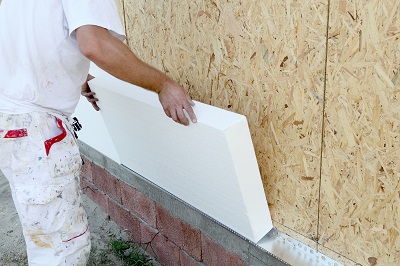With a variety of uses across diverse sectors, demand for expandable polystyrene (EPS) is on the rise across the world. Asia-Pacific is now the largest regional market, projected to reach a value of almost US$11 billion by 2019 and representing an estimated 40% of the total global volume consumption. From food trays and disposable cups to electrical goods packaging and building insulation, the excellent water resistance, high stiffness and relatively light weight of EPS means that it is featuring in an increasing number of applications. This creates opportunities for foam producers to benefit from mega-trends including rapid urbanization, which are resulting in increased EPS consumption across major end-use industries such as construction.
In order to capitalize on the potential offered by such markets, EPS needs to deliver on a number of properties including: low density after expansion, a homogenous foam structure, good mechanical strength at higher temperatures and no water uptake by the foamed beads. A short maturation period, fast molding cycle times and easy mold release are all necessary if the required performance is to be achieved quickly and in a cost-effective manner.
Processing aids can be used to save time and overcome challenges during the foaming process, as well as improve the final application properties of EPS. Corbion offers a toolbox of PATIONIC® polymer additives for the manufacture of EPS beads via a suspension polymerization process. The high performance solutions deliver real and differentiated value, helping formulators to open the door to new industries and meet needs that are currently unmet in the polymers market.

Corbion’s PATIONIC® portfolio are ideal for building and insulation
Faster, trouble-free processing
Various quantities of electrostatic charge on the surface of pre-foamed EPS particles may lead to a number of issues, including flowability problems due to the agglomeration of beads and inhomogeneous mold filling during the final step of the expansion. Treating the beads with an anti-static agent can help to overcome these difficulties. With a number of processing aids to choose from, glycerol esters – the chemistry behind Corbion’s PATIONIC® portfolio – are growing in popularity with producers and are supported by a solid bank of published literature.
PATIONIC® 909, for instance, is a glycerol monoester that can be added prior to the pre-expansion stage. The polar hydroxyl groups from the glycerol moieties are sensitive to moisture in the air and this results in the dissipation of the electrostatic charges, ultimately reducing the agglomeration of EPS beads. Meanwhile, PATIONIC® 919, a glycerol triester, facilitates the merging of the EPS beads during the final expansion step in the mold and thus contributes to a homogeneous foam. The use of PATIONIC® 919 will also result in an easier mold release for the EPS foam.
Tests carried out by customers have demonstrated that PATIONIC® polymer additives are particularly well-suited to EPS beads for high-end applications such as insulation for the building and construction industry. The narrow particle size distribution of both PATIONIC® 909 and 919 forms a more homogeneous layer around the EPS bead, so that the effectiveness of both additives on the EPS foam quality and the final foaming process improves.
Understanding the chemistry
As combinations of glycerine and fatty acids, glycerol esters occur naturally as triglycerides in vegetable oils and animal fats. The chain lengths and levels of saturation of the fatty acids determine the final properties of the glycerol esters, including polymer migration, lubrication properties, volatility, shelf-life, crystallinity and surfactant activity. Predominantly based on stearic acid, glycerol stearates have high levels of saturated fatty acids leading to a solid appearance at room temperature. Meanwhile, other glycerol esters, such as oleic acids, have high levels of unsaturated fatty acids. At room temperature, the resulting glycerol oleates are semi-solid or liquid.
Mono or mono/di esters are required for optimum performance in the majority of industrial applications. The naturally occurring triester undergoes glycerolysis and, after excess glycerine is removed, the final product of this chemical reaction is the mono/diester and a small amount of triester. To further refine to a 95% monoester product, distillation can be used. Alternatively, the triesters that have been used in the production of mono/diesters can be chemically hardened by hydrogenation to achieve high levels of saturation.

Corbion offers a toolbox of PATIONIC® polymer additives for various applications
Future applications
Cost, quality and performance all need to be taken into consideration when choosing an anti-static agent. With other polymer additives on the market including quaternary ammonium salts, alkylphosphates and ethoxylated-propoxylated fatty alcohols, glycerol esters offer multiple benefits including the fact that the products can be made directly from vegetable oils, reducing waste by eliminating the need to prepare separate reactants or use more complex chemistry.
With the adaptability of EPS creating new market opportunities for foam producers, Corbion is currently working side-by-side with its customers to explore how its broad portfolio of high quality polymer additives could further enhance the performance of the final application. Its experienced team of polymer chemists and applications engineers also continue to research ways in which its solutions can act as processing aids throughout the foaming process, to overcome specific challenges faced by individuals and save time and money during production.
Corbion is the global market leader in lactic acid, lactic acid derivatives and lactides, and a leading company in emulsifiers, functional enzyme blends, minerals and vitamins. The company delivers high performance biobased products made from renewable resources and applied in global markets such as bakery, meat, pharmaceuticals and medical devices, home and personal care, packaging, automotive, coatings and adhesives. Its products have a differentiating functionality in all kinds of consumer products worldwide. In 2015, Corbion generated annual sales of €918.3 million and had a workforce of 1,673 FTE. Corbion is listed on Euronext Amsterdam.














